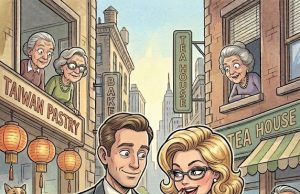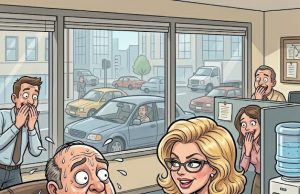
Lucía didn’t go to prom. Her mother told her it was a waste of time. And spending money on a new dress she’d probably never wear again made no sense.
Prom night was supposed to be a shining bridge between childhood and adulthood, but for Lucía, it became a door slammed shut right in front of her. The air in the small apartment in Valencia was thick and stale, smelling of boiled cabbage and unfulfilled dreams.
“Do you want to go to a dance? Do you want me to buy you a dress?” Her mother’s voice, Carmen, was as flat as a board and as cold as a knife’s edge. “That’s nonsense. Spending money on a piece of cloth you wear once and then throw away… that’s the greatest folly.”
Lucía gazed silently out the window, where the sunset dyed the sky a wine-like red. In her mind’s eye, she pictured the dress she dreamed of: light blue, like a piece of the sky, made of a fabric so light it would rustle with every step.
“You pick up the diploma and come straight home,” her mother continued categorically, tying her apron. “Then take Diego to practice. He can’t wait.”
“But, Mom…” Lucía’s voice broke. “How can I leave like this? Everyone will take pictures, say goodbye… Can I stay at least at first? Then I’ll leave quietly, I promise…”
Carmen slowly turned to her. Her eyes, gray and deep like an abandoned well, stared into her daughter’s gaze. There wasn’t a spark of warmth in them, only tiredness and stale annoyance.
“I’ve already said it. Don’t make me repeat it twice.”
Disobedience meant disaster. Lucía had known that since she was a child. She nodded silently, swallowing the lump in her throat. A tear trickled down her cheek and evaporated in the palm of her hand.
The high school auditorium vibrated with laughter, music, and cheerful voices. Girls in sparkly dresses fluttered like butterflies, and boys in uncomfortable suits tried to look older. Lucía sat on the edge of a chair, like a ghost at her own celebration. Her old cotton dress was an ugly stain against that glittering background. She felt the curious or pitying glances of her classmates, each one like a pinprick.
As soon as the diplomas were handed out, she jumped up and ran for the exit, clutching the red folder to her chest like a shield. Her heart was breaking. She ran through the cobblestone streets of the city, not knowing where she was going, and finally the sobs broke out—harsh, bitter, desperate.
Lucía felt it with cruel clarity: her mother didn’t love her. She had never loved her. And that certainty had always lived in her, like breathing. Carmen almost never spoke to her—she only gave orders. Her gestures were strange and mechanical: fixing her collar, straightening her dress. Never a caress, a kiss on the forehead, a comforting hug. The punishment for the slightest mistake was icy silence, total indifference. She behaved as if Lucía didn’t exist. And that could last for weeks. Once, even two whole months. Lucía didn’t even remember what she had done then. She had erased that pain from her memory so as not to go crazy.
She always tried hard to be “the good daughter”: she got excellent grades, cleaned, ironed, without complaint. She dreamed that one day her mother would recognize her efforts, smile at her, and say, “Well done, daughter.” But no. Carmen always found a reason to criticize, an excuse to start a new silent war.
From snatches of family conversations, Lucía knew that her parents hadn’t been able to have children for a long time. They’d gone through doctors, tests, treatments… And when there was no more hope, she had arrived.
“How strange,” she often thought before falling asleep through tears. “They waited so long for me, and when I was born they weren’t happy at all. Otherwise, why do I feel so cold? And Dad… he’s good, but distant, as if I bothered him. But with Diego… he’s overflowing with affection.”
With the birth of her brother, her childhood—already lacking in warmth—was finally over…
What little remained of it vanished the moment Carmen held the boy to her chest, with tears in her eyes and a smile Lucía had never seen before.
For years, she lived in Diego’s shadow. He got the best clothes, the freshest slices of bread, the warmest glances. Lucía was the one who got up early to make breakfast, the one who ran to the store, the one who cleaned the house in silence and did homework until late, under the dim light of a lamp. Diego always received a caress, an encouraging “very well,” a whispered “I love you” before bed. She – nothing.
That night, after fleeing the graduation party at Valencia High School, Lucía collapsed on a bench in a nearly empty park. The summer sky sparkled with stars, and the silence was broken only by the chirping of crickets. She clutched her school diploma to her chest, but the paper didn’t warm her heart. She felt cold, even though the air was warm.
For the first time, she thought her life could have been different. That in another city in Spain, there were mothers who, at that moment, hugged their daughters, bought them blue dresses, and took pictures of them on the school steps. What would it have been like if she had been born there, to a different family?
Footsteps brought her out of her thoughts. She looked up and saw a strange woman walking with a child by the hand. The woman was smiling, and the little boy was telling her something, gesticulating excitedly.
That simple image struck her harder than all the reproaches of her past.
“It’s possible. That also exists,” Lucía told herself. And then, for the first time, she felt a strange rebellion, like a flame igniting inside her. Until that moment, pain had forced her to obey, to try to prove that she deserved to be loved. But now she understood: true love isn’t earned with good grades or shiny floors. It’s given. And if it’s not there, it can’t be ripped away by force.
Lucia stood up from the bench. Her eyes burned, but the tears had dried. Suddenly, she felt lighter. The diploma in her hands was no longer a shield, but a passport to another life. She might not have a dress, or photos from the dance, but she carried one certainty in her heart: she would never repeat her mother’s story.
She returned home late, on tiptoe. In the kitchen, Carmen was waiting for her with her arms crossed. Her gaze was cold, but Lucía no longer felt the fear she had felt before.
“You’re late,” her mother said. “You know what that means.”
Lucia lifted her chin. There was no submission in her eyes anymore, only determination.
“No, Mom. Not this time.”
And for the first time, the silence that fell wasn’t a punishment, but the beginning of liberation.

















